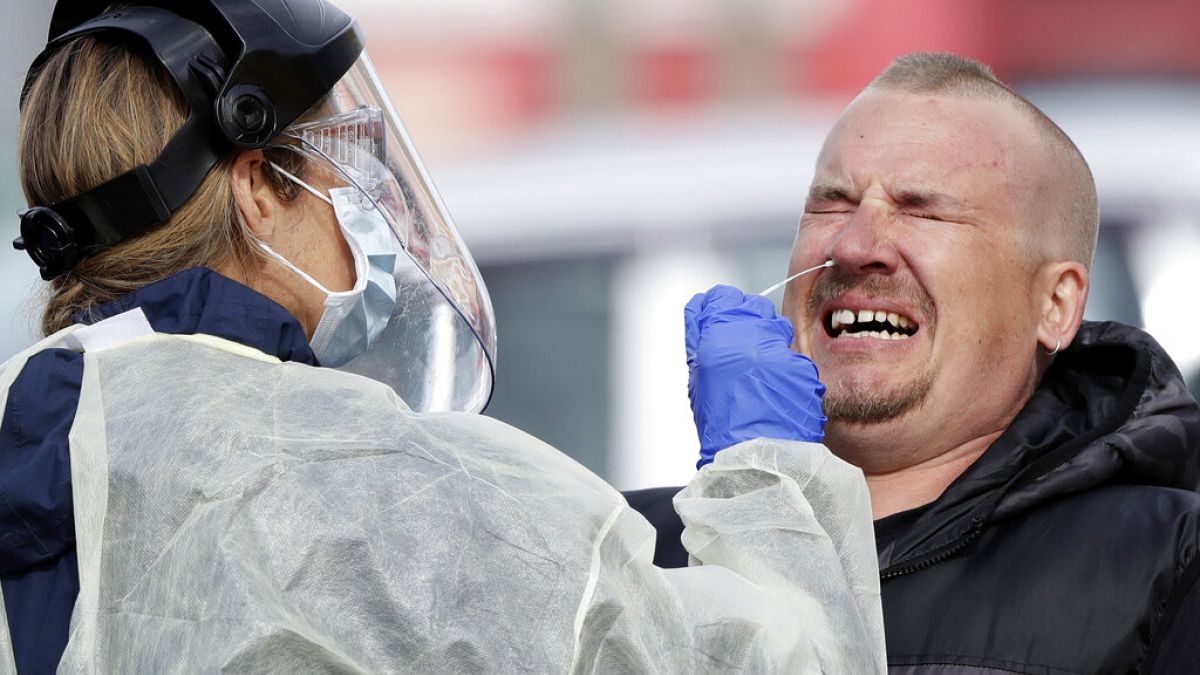Euronews invited two experts to answer your coronavirus questions. They covered a lot, from lockdown to masks and vaccines to hydroxychloroquine.
Still confused about when and how to wear masks? What is hydroxycholoroquine? And can you have COVID-19 twice?
There’s a lot of confusion about COVID-19 right now.
In a live Q&A session on Euronews — which you can watch back in the video player, above — we put some of your coronavirus questions to our panel of experts:
- Professor Luke O'Neill, an immunologist and head of the inflammation research group at Trinity College in Dublin
- Dr Suerie Moon, co-director of the Global Health Centre in Geneva
When is it safe to ease the lockdown? Are restrictions being eased too soon?
"It's true that governments are all engaging in massive experiments," said Dr Moon. "Nobody has all the answers on what's the perfect timing and what is the best way to lift lockdown conditions.
"But there is a consensus that is emerging among the scientific community on a number of conditions that countries have to be considering:
"How do you put out the fire that is burning? We have to get the forest fire to come down to embers, we have to, get the epidemic under control.
"How well can we track what's happening afterwards? And this has to do with the testing capacity that a country has in place.
"How well are the hospitals functioning? Are hospitals still overburdened or is there room to take on new patients if again we have a flare-up?
"Finally, can we find the new cases, can we isolate them, can we trace contacts and put people in quarantine so that there isn't a second wave of infections as countries slowly begin to relax their lockdown measures?
"Every country is different, every government has to make these decisions for itself. So, on the one hand, it's understandable that countries are taking different approaches but, on the other hand, it's a huge experiment and we're all watching different countries to see who's figuring it out and who is making big mistakes."
So which country has the best strategy?
"Iceland is top of the class, they began testing very quickly and extensively, so we like Iceland because they have been very effective," said Professor O'Neill.
"Germany has done a fantastic job as well, they got in very early with testing, those are the two countries that really stand out at doing a great job. (...)
"But, in truth, it's a mixed picture, some countries aren't doing enough and there have been problems with getting enough test kits in (…) so it has been a challenge for some countries."
Can people be infected more than once?
"The answer is we don't fully know but there is good evidence that you're probably protected if you've been infected," said Professor O'Neill.
"For example, there was an experiment done with monkeys which they infected with the virus and then tried to re-infect them and they couldn't. Secondly, we know we make a big antibody response to this virus, loads of antibodies are churning in your system. They are the real virus-busters by the way and if you carry those antibodies then it means you had the virus and are no longer infectious.
"There is good evidence that you should be protected, the question is how long will that protection last and people who work on other coronaviruses say about a year maybe which is good."
What's the best medication to fight COVID-19? What about hydroxychloroquine?
"Hydroxychloroquine is interesting because it has shown to have effects against the virus (…) but we've got to be very, very careful though because there is no doubt it damages the heart in a small number of patients," said Professor O'Neill.
"The problem is COVID-19 is heart-damaging as well. So the worry we have there is this is a double-whammy if you give this medication to someone and they've already got heart problems, there is a risk it might make it worse. The trials are progressing very, very carefully and there is still no compelling evidence that it works. We've got to wait for these trials and then we'll know. I would urge caution with this drug until those trials are done. (...) In the next three or four weeks, that's the key window now, for some of these medicines the results will begin to emerge and we're all keeping our fingers firmly crossed."
"There are concerns about safety on a couple of levels, some patients have very toxic reactions to hydroxychloroquine or other drugs so we have to be quite cautious," Dr Moon said.
"It's normal that there is a lot of panic during a pandemic with a new virus. Doctors and nurses are faced with very difficult decisions every day. So it's understandable that we're throwing the medicine chest at patients in some ways but we really have to be very cautious and let the trials answer the questions in a definitive way."
How do we make sure people have access to the drugs once an effective one is found?
"We've seen that a number of governments have put in place export restrictions and countries that have the capacity to manufacture the medicines will most likely make sure their own people are served first," said Dr Moon.
"We have a huge concentration globally in the way that medicines are manufactured, only a handful of countries have large-scale manufacturing. So the question of how we make sure that effective drugs reach everybody who needs them in all countries without bankrupting health systems is a huge issue, we have not made enough progress in addressing [it]."
What about a vaccine, when is that going to happen?
"It's not realistic to say we are going to have any vaccine approved until next year," said Dr Moon. "People estimate at least 12 to 18 months to have regulatory approval of that vaccine which is not the same thing as saying it's been manufactured and is available around the world.
"This is really unprecedented, I have to emphasise that we have never before had a pandemic that has spread so quickly to the entire world that everybody needs access to the drugs and the vaccines at the same time.
"I am more worried about medicines because we are going to see the results of the trials are going to come out in the next few weeks and the scramble for drugs is going to be instant. We don't have the measures in place either to ramp up production, get over export bans or make sure that some of the developing and poor countries have the money to compete as buyers with some of the richer countries. We are going to see countries really being left behind in the scramble for drugs."
This disease does not just cause respiratory symptoms, what are the other effects possible?
"It's a nasty virus," said Professor O'Neill. "The receptor for the virus called ACE 2, that's the thing the virus locks on to with its spikes, to get inside cells, that is in your lungs, in your gut, it's in your heart and it may even be in your brain. So it's not just the lungs but people mainly die of respiratory failure. The others are more symptomatic, although there may be a cause of death in these tissues as well, but, the main cause of death is the lung problem."
What should I take if I have mild symptoms?
"There is no cure, there is nothing obvious," said Professor O'Neill. "You take paracetamol for your temperature because fever is a key feature. Paracetamol is a very safe drug that works very well to bring down the fever and it can help with some of the aches and pains, the typical flu-like symptoms. Stay very well hydrated, drink lots of water. Your immune system uses a lot of water to keep it going. And you have to look after your immune system, That means trying to get a good night's sleep, try and exercise and have a good diet and try and de-stress because that really damages our immune response."
What is the deal with masks? Does it protect you against the virus outside?
"The primary purpose of wearing masks is to protect everybody else," said Dr Moon. "If you are sick and of course many of us don't know if we're carrying the coronavirus, but whatever the case, if you're wearing a mask you will minimise the amount of virus you are putting into the atmosphere.
"There is a hypothesis that Asian countries where it is more customary to wear a mask, the fact that many are wearing masks has helped get this epidemic under control.
"But a lot of countries are really experimenting while watching others very closely to see what seems to be making a difference and what doesn't.
"There is a major concern that if many people go out to buy masks, there will be a shortage in hospitals and there is another concern that if you don't know how to use a mask and you touch it and touch your face, you may increase the risk. So it's not a black and white issue and I think that's why everyone is really wrestling with what do we recommend to our people."


